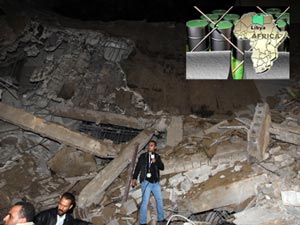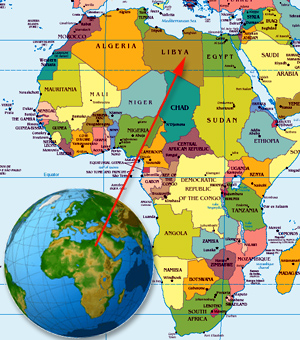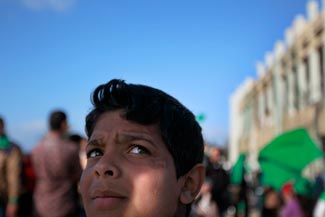World class 'hypocrisy' in Libyan attacks
By Saeed Shabazz -Staff Writer- | Last updated: Mar 22, 2011 - 9:05:08 PMWhat's your opinion on this article?
Obama ignores Minister Farrakhan's warning; bombs fall on the Muslim nation of Libya
 A journalist stands in the rubble after a missile totally destroyed an administrative building of Libyan leader Muammar Gadhafi’s residence in Tripoli, Libya, on March 20. The building, which was about 50 metres (165 feet) from the tent where Col. Gadhafi generally meets guests, was flattened. The United States under President Ronald Reagan attempted to assassinate Col. Gadhafi by bombing his residence during a 1986 operation. Gadhafi escaped the attempt but his daughter was killed. EPA/MOHAMED MESSARA |
With President Barack Obama's vocal approval, military assaults on Libya started March 19, with French planes striking anti-aircraft and other locations, including a military convoy, followed by 112 Tomahawk cruise missiles fired from five U.S. ships in the Mediterranean.
The UN Security Council March 21 rejected a Libyan request for an emergency meeting to halt what it called “military aggression” by France and the United States, and the council was scheduled to get a March 24 briefing from the secretary-general at Final Call presstime.
Council members held closed-door discussions in response to a letter dated March 19 from Libyan Foreign Minister Musa Kousa who charged that “an external conspiracy was targeting ... (Libya) and its unity and territorial integrity.”
 |
The Security Council late March 17 adopted a resolution authorizing military action to protect civilians from attacks by forces loyal to Col. Gadhafi and imposed a no-fly zone over the country. On March 19, U.S., French and British forces launched airstrikes against Libyan air defenses, tanks, armored personnel carriers and other military hardware.
India's UN Ambassador Hardeep Singh Puri said the resolution requires Secretary-General Ban Ki-Moon to report to the Security Council “within seven days” on the implementation of its provisions, which also include a more robust arms embargo and additional Libyan individuals, companies, banks and other entities subject to travel bans and asset freezes.
One of the sticky issues if the council had agreed to an emergency meeting would have been who would speak for Libya. The entire Libyan mission to the United Nations, including the ambassador and deputy ambassador, is supporting the opposition and has called for Col. Gadhafi to step down.
Amb. Kousa sent another letter just before the council vote.
The March 17 letter, also obtained by AP, argued that “Libya's actions are a legitimate response against terrorism as it seeks to defend itself and to prevent terrorism from spreading in the Mediterranean region and al-Qaida from infiltrating Europe, in accordance with the counterterrorism instruments to which it is party.”
Amb. Kousa charged the draft resolution and the resolution adopted by the council on Feb. 26 exceeds the council's mandate, violates international law, human rights, and the UN Charter, and sets “a dangerous precedent.”
The earlier resolution imposed an arms embargo on Libya and a travel ban and asset freeze on Col. Gadhafi and members of his family and regime. It also referred Libya to the International Criminal Court for possible crimes against humanity.
Failure to intervene in other crises
The foreign minister asked why the Security Council didn't similarly intervene in other conflict situations between a state and armed groups such as the Palestinians, Chechnya, the Lord's Resistance Army, Kashmir and Algeria.
“This indicates that the Security Council has double standards and raises suspicions that this is an attempt to seize Libya's resources, its funds deposited abroad and its oil revenues in order to pay off the debts accumulated by certain states as a result of the global economic crisis,” Amb. Kousa wrote.
 Libyan supporters of Moammar Gadhafi gather at his Bab Al Azizia compound in in Tripoli, Libya, March 19. President Barack Obama authorized limited military action against Libya, saying Moammar Gadhafi ’s continued assault on armed rebel fighters left the U.S. and its international partners with no other choice. The Pentagon said 112 cruise missiles were launched from U.S. and UK ships and subs, hitting 20 targets. Photo: AP Photos/Jerome Delay |
But Russian Prime Minister Vladimir Putin March 21 condemned UN Security Council resolution 1973 in the media, saying it is “defective and flawed.” It “resembles medieval calls for crusades,” he said.
Ironically, news outlets in the U.S. reported that Col. Gadhafi called the UN-sponsored invasion a “colonial crusade.” Russian president Dimitry Medvedev quickly called the crusade reference “unacceptable,” according to media outlets. Still a Russian Foreign Ministry spokesman issued a statement calling for an end to “indiscriminate” bombing of Libyan targets, adding, the airstrikes exceed the mandate of the UN Security Council resolution.
There were also mixed reports as pictures and news of the attacks, including the bombing of Col. Gadhafi's compound in Libya, got out: The 22-nation Arab League called for an emergency meeting, saying air strikes were not their aim of in calling for the no-fly zone. But, Bloomberg news service reported Arab League secretary-general Amr Moussa said he stood behind the UN resolution.
Obama's decision raises concern at home
At home the president faced criticism from the right and the left, questions were raised whether the constitution had been violated, concern was expressed that U.S. objectives weren't clear and fears were voiced that this was another military adventure the country didn't need and could not afford.
|
Related news: Libya: North African nation, leader have withstood West's attacks (FCN, 03-08-2011) Al Qathafi Seeking UN, AU Probe into Libyan Unrest(Tripoli Post, 03-06-2011) Who is Muammar Gaddafi? (SHOAH, 03-04-2011) Massive Disinformation War against Libya for US/West Military Intervention? [The 4th Media] (03-01-2011) Libya rejects Al Jazeera report it"bombed protesters",use of mercenaries (Al Jazeera, 02-22-2011) Fidel Catro:NATO's plan is to occupy Libya (Granma, 02-21-2011) Web Video: Interview with Col. Muammar Gadhafi(FCN, 09-27-2009) Mandela's visit to Libya raises questions about U.S. policy(FCN, 11-04-1997) TIME, 1986 - LIBYA: Real and Illusionary Events (TIME Magazine, 10-13-1986) ===================================== Capital:Tripoli Independence: Population:6.17 Million Religions:Islam 97%, other 3% Language:Arabic (official), Italian, English Government type: |
The Muslim leader had advised President Obama, who has said Col. Gadhafi must go, to be careful of the plots coming from advisors that urged military action.
U.S. Ambassador to the United Nations Susan Rice told reporters after passage of the resolution that Col. Gadhafi “has lost his legitimacy, there is no justification for his continued leadership.”
Many called the Security Council Resolution 1973 a fig leaf to cover a war against Libya meant to end in regime change. “The long term goal, unspoken but well understood, is regime change—displacing the government of Libya's leaders Muammar Qaddafi with a new regime built around the rebels,” noted Stratfor.com, an international intelligence report.
“You can't order him (Col. Gadhafi) to step down and get out,” Min. Farrakhan warned in his Feb. 27 Saviours' Day address. “Who the hell do you think you are, you can't talk to a man that built a country for 42 years; and ask him to step down and get out.”
Min. Farrakhan urged the president to “organize” a group of respected Americans and ask for a meeting with the Libyan leader. His words went unheeded.
But from its headquarters, the African Union announced virtually the same option March 18 in Addis Ababa, expressing opposition to the no-fly zone and “foreign military intervention.” A five-member committee was formed to handle the Libyan crisis. Heads of state Jacob Zuma of South Africa; Gen. Sassou Nguesso of Congo; Mali's Amadou Toumani Toure; Mouhammad Abdul Azziz from Mauritania and Ugandan leader Yoweri Museveni met for the first time in Mauritania on March 19. President Teodore Obiang Nguema of Equatorial Guinea, who is also AU chairman, AU Commission President Jean Ping, and the five heads of state were reportedly on their way to Tripoli with proposals for Col. Gadhafi.
The Final Call was told the AU high-level committee may have been stopped from entering Tripoli—but it is not known who stopped them and staff was unable to confirm the report March 21. The AU office in New York had not returned phone calls by Final Call press time.
UN, Western military assault condemned
Zimbabwe's President Robert Mugabe told The Herald newspaper that to force President Gadhafi out would invite Western influence and chaos. “We want to hear the truth about the situation. We took exception with interference by Western powers—we absolutely reject their intervention,” he told the Zimbabwean newspaper.
Min. Farrakhan warned Americans to look beneath the surface to see who stood to benefit from the unrest in Libya.
Latin America leaders, including Venezuela President Hugo Chavez, called the military action irresponsible” and “interference in the internal affairs” of a country, according to Agence France Presse. The news service said Cuban revolutionary leader Fidel Castro questioned the “usefulness” of the UN Security Council.
Bolivian President Evo Morales said, “Ultimately” the West is “interested in controlling Libyan oil”—a position also espoused by President Chavez. Nicaraguan President Daniel Ortega expressed support for the Libyan leader and also called the military assault part of a plot to control Libya's oil.
The people here in the U.S. and around the world say this is a war for oil, said Sara Flounders, co-founder of the International Action Network, an anti-war group that has been holding protest rallies in New York streets since March 18.
“This is a war against the African people in Libya and it has nothing to do with any humanitarian cause,” Ms. Flounders told The Final Call. “And it is important to point out that another objective of this war is to intimidate those in North Africa who would be willing to start a revolutionary movement against Western imperialism,” she added.
At the United Nations, China said too many unanswered questions existed for a favorable vote on the UN resolution. Chinese Ambassador Li Baodong told reporters that his delegation asked specific questions that failed to be answered and, therefore, had serious difficulty with the resolution. China abstained from voting.
Germany's Ambassador Peter Wittig told the Security Council his country would not supply any forces in the military action. “Germany saw great risks, and the likelihood of large-scale loss of life,” said the diplomat
The Brazilian ambassador said the actions approved by the council “might have the unintended effect of exacerbating the current tensions on the ground.” Five nations abstained from voting on the resolution—Brazil, India, Germany, China and the Russian Federation.
China and Russia said they did not use their veto out of respect for the Arab League's call for the no-fly zone.
UN Secretary-General Ban Ki-Moon made it a point with the UN press, saying that in adopting the resolution, the council had placed great importance on the appeal of Arab League states for action.
But President Mugabe took exception with the talk of the Arab League position, telling fellow African heads of state: “Intrinsically, geographically, culturally, Libya is African, and African solutions are needed.” Col. Gadhafi has also expended resources and effort to build relations in Africa and support a United States of Africa after the 1986 bombing of his compound by American forces with little objection from the Arab League.
The anti-war movement also rejected use of the Arab League as cover to invade Libya. “Every form of fraud and propaganda is being used to push for this intervention, including a supposed ‘vote' by the Arab League,” said the International Action Center in a press statement.
Arab support for a no-fly zone was a prerequisite for the U.S., which didn't want to be seen as starting another war against a Muslim nation. Also, at Final Call press time, Egypt and Saudi Arabia had declined to send aircraft to participate in the no-fly zone.
The Economist magazine noted keeping Libya's air force grounded allowed rebel forces to move freely across Libya's vast desert territory.
‘Hypocritical concern' for civillians
Phyllis Bennis, of the Washington-based Institute for Policy Studies and author of “Calling the Shots: How Washington Dominates Today's UN,” said it is interesting how the U.S. can become a dominating force at the United Nations to protect the human rights of some nations and not others.
The U.S. position was a “double-standard” and “hypocritical,” she said.
“The U.S. has no problem defending the rights of Libyans, and rightfully so, but not the human rights of the Palestinians,” Ms. Bennis noted.
How does the U.S. merely condemn the actions of the president of Yemen, whose forces have killed 52 and injured hundreds of his people the same day the air strikes hit Libya? she asked. “That's what hypocrisy looks like,” said the analyst.
Bloggers across the political spectrum questioned whether it was proper to stop Col. Gadhafi from defending himself against an internal security threat. Under established norms, states do not have the right to interfere with Libya's internal affairs, some analysts said.
Meanwhile, the Center for Strategic and Budgetary Assessments put the cost of the no-fly zone at $400 million to $800 million for coalition forces. The cost to maintain a coordinated zone would be $30 million to $100 million a week, said the center. The 112 Tomahawk cruise missiles fired by the U.S. on the first day cost $1 million to $1.5 million apiece, costing American taxpayers $112 million to $168 million, according to Yahoo News.
(The Associated Press contributed to this report.)
Related news:
UN Secretary General forced to take refuge after being unnerved by by pro-Gadhafi protesters in Cairo Egypt (Daily Mail, 03-21-2011)
Africom: President Obama's Bush inheritance, challenge (FCN, 10-26-2009)
Web Video -Africa: America's New Frontline(Al Jazeera, 09-25-2009)
Obama then Hillary: U.S. scrambles for Africa(FCN, 08-31-2009)
Re-packaged AFRICOM still not good for Motherland(FCN, 07-01-2009)
Is Africa throwing off the yoke of dependency?(FCN, 06-30-2009)
Is Africom a U.S. military maneuver or real help?(FCN, 02-05-2009)
The global exploitation of Africa's land and people(FCN, 08-21-2008)
Africa rebukes Bush on African Command(FCN, 07-11-2007)
No comments:
Post a Comment